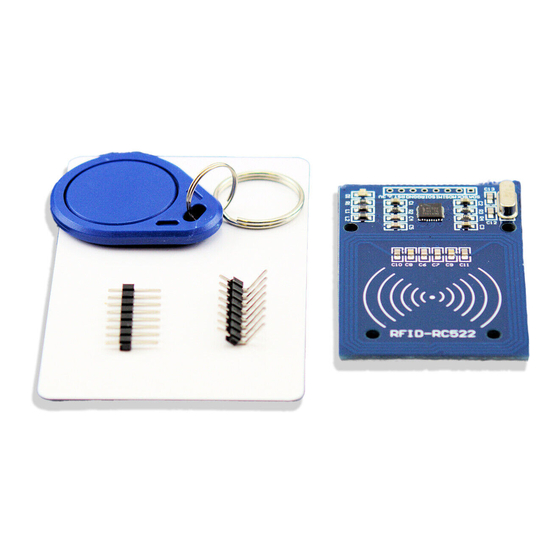
Advertisement
Quick Links
█ www.freenove.com
RFID Freenove RFID-RC522 Module
Now, we will learn to use the RFID (Radio Frequency Identification) wireless communication technology.
Project 1 Read UID
In this project, we will read the unique ID number (UID) of the RFID card, recognize the type of the RFID card
and display the information through serial port.
Component List
Freenove UNO x1
Mifare1 S50 Standard card x1
USB able x1
RC522 RFID Module x1
Mifare1 S50 Non-standard card x1
Jumper F/M x7
RFID
1
Advertisement

Summary of Contents for Freenove RFID-RC522
- Page 1 █ www.freenove.com RFID RFID Freenove RFID-RC522 Module Now, we will learn to use the RFID (Radio Frequency Identification) wireless communication technology. Project 1 Read UID In this project, we will read the unique ID number (UID) of the RFID card, recognize the type of the RFID card and display the information through serial port.
- Page 2 RFID www.freenove.com █ Circuit knowledge RFID RFID (Radio Frequency Identification) is a wireless communication technology. A complete RFID system is generally composed of the responder and reader. Generally, we use tags as responders, and each tag has a unique code, which is attached to the object to identify the target object. The reader is a device for reading (or writing) tag information.
- Page 3 █ www.freenove.com RFID RC522 RFID Module Technical specs: Working Voltage 3.3V Working current 13 ~ 26mA Idle current 10 ~ 13mA Sleep current < 80uA Peak current < 30mA Working frequency 13.56MHz Supported Card type Mifare1 S50, Mifare1 S70, Mifare UltraLight, Mifare Pro, Mifare Desfire...
- Page 4 RFID www.freenove.com █ block 0 data block block 1 data block sector 1 block 2 data block block 3 Password A-access control-password B control block …… …… …… …… block 0 data block block 1 data block sector 0 block 2...
- Page 5 █ www.freenove.com RFID Circuit The connection of Freenove UNO board and RFID module is shown below. Schematic diagram Hardware connection...
- Page 6 RFID www.freenove.com █ Sketch Sketch 1 Before writing the code, we need import the library RFID.zip first. This sketch will read the unique ID number (UID) of the card, recognize the type of the card and display the information through serial port.
- Page 7 █ www.freenove.com RFID rfid.halt(); // command the card to enter sleeping state void ShowCardType(unsigned char * type) Serial.print("Card type: "); (type[0] == 0x04 && type[1] == 0x00) Serial.println("MFOne-S50"); else if (type[0] == 0x02 && type[1] == 0x00) Serial.println("MFOne-S70"); else if...
- Page 8 RFID www.freenove.com █ After verifying and uploading the code to UNO, open the serial port monitor and make a card approach the sensing area of RFID module. Then serial port monitoring window will display the displacement ID number and the type of the card. If the induction time is too short, it may lead to incomplete-information display.
-
Page 9: Important Note
FCC Statement This device complies with part 15 of the FCC rules. Operation is subject to the following two conditions: (1) thi s device may not cause harmful interference, and (2) this device must accept any interference received, incl uding interference that may cause undesired operation. Changes or modifications not expressly approved by the party responsible for compliance could void the user’... - Page 10 0dBi for 13.56MHz; 2.8 Label and compliance information The final end product must be labeled in a visible area with the following" Contains FCC ID: 2A4TN-FN-RFID-RC522". 2.9 Information on test modes and additional testing requirements Host manufacturer is strongly recommended to confirm compliance with FCC requirements for the transmitter when the module is installed in the host.
- Page 11 ISED Statement ‐ English: This device complies with Industry Canada license‐exempt RSS standard(s). Operation is subject to the following two conditions: (1) This device may not cause interference, a nd (2) This device must accept any interference, including interference that may cause undesired operation of the device.
Need help?
Do you have a question about the RFID-RC522 and is the answer not in the manual?
Questions and answers